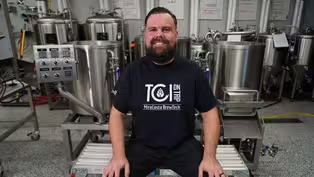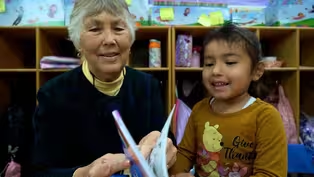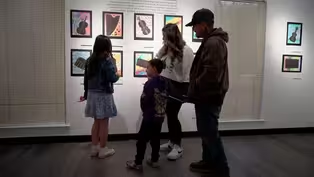Inside California Education
AP African American Studies: Beyond the Textbook
Clip: Season 6 Episode 5 | 6m 2sVideo has Closed Captions
Discover AP African American Studies, where students explore Black history and culture.
Discover AP African American Studies, where students explore Black history and culture.
Problems playing video? | Closed Captioning Feedback
Problems playing video? | Closed Captioning Feedback
Inside California Education is a local public television program presented by KVIE
Funding for the Inside California Education series is made possible by the California Lottery, SchoolsFirst Federal Credit Union, Stuart Foundation, ScholarShare 529, and Foundation for the Los Angeles Community Colleges.
Inside California Education
AP African American Studies: Beyond the Textbook
Clip: Season 6 Episode 5 | 6m 2sVideo has Closed Captions
Discover AP African American Studies, where students explore Black history and culture.
Problems playing video? | Closed Captioning Feedback
How to Watch Inside California Education
Inside California Education is available to stream on pbs.org and the free PBS App, available on iPhone, Apple TV, Android TV, Android smartphones, Amazon Fire TV, Amazon Fire Tablet, Roku, Samsung Smart TV, and Vizio.
Providing Support for PBS.org
Learn Moreabout PBS online sponsorship(Donald tapping on desk) - [Narrator] Creating this rhythmic beat isn't part of a music class at Susan Miller Dorsey High School in Los Angeles County.
It's actually a small piece of a unique advanced placement course, called "AP African American Studies."
Dr.
Donald Singleton is happy to give life to an often overlooked subject.
(tapping ending) (gentle music) - Thank you, give it up for those who helped.
(students applauding) - AP African American Studies is an interdisciplinary course.
It brings together history, art, music, political science, and so many other genres of study to emphasize the beauty and the brilliance, the resilience of Africa.
(gentle music) - In four units, focusing on the African diaspora, the transatlantic slave trade, reconstruction, and the movements and debates of Black culture, the course aims to educate students in all things African and African-American.
(gentle music ending) - Africa is the birthplace of humanity, and it is really important that people learn more about that.
(ambient music) - If you take a course in AP African American Studies, you learn things you would've never learned in your AP world history classes, in your AP US history classes, there are some bits and pieces of this in another classes, but there's no class that focuses on this subject.
- Before taking this course, I knew that a lot of contributions to society were from African-Americans and Black socialists, and philosophers, I didn't know the extent of the reach that they impacted.
- [Narrator] As a senior aspiring to attend a historically Black university, Brennen says this AP course has been integral to her high school journey.
- I thought if I didn't take it, it would be at a disservice to myself, because it's a resource that very little students have that I'm taking advantage of.
In the African-American Studies class, I can learn about something that's not only true, but also relates to me, and makes me feel empowered to learn about my culture.
(gentle music) - AP African American Studies was developed by the College Board, and began with a two-year pilot program.
Susan Miller Dorsey High School was part of that early effort.
But the courses faced significant opposition in some states.
It's been banned or restricted in Florida, Arkansas, and South Carolina.
- Susan Miller Dorsey High School was the first public high school in California to offer this course.
When we started, 60 schools offered it, then the next year, 700 schools offered it, and now 1,600 schools in the country offer this course.
And so I would like to see this course in every classroom.
- [Narrator] More than 115 schools in California now offer the course, among them, Valley View High School in Riverside County.
The popular course taught by Gabriel Arnold draws students of all ethnicities and backgrounds.
- I think one reason it's very important is representation, I do believe representation does matter.
Students are very hungry to learn about things that they feel is sort of hidden from them.
- Being in this class allowed me to really just appreciate, appreciate me, appreciate my identity, and appreciate what I have come from.
It makes me want to talk to other young Black girls like myself that have struggled with their identity, and it allows me to want to bring up the younger generation around me.
- As I often say to my students, "The more we like know about one another, the less likely we are to dislike one another", so it's really fostering this kind of community, where people learn about each other, and celebrate each other, rather than tear each other down.
- [Narrator] Opponents of the course, including political leaders in Florida, say it indoctrinates students to a political agenda, and teaches critical race theory.
Dr.
Singleton and other advocates of the course disagree with that characterization.
- I believe that some of the misconceptions about the course is that somehow we are speaking negatively about another race, that the whole course is designed to criticize another race.
That's far from the truth.
What we do think about doing is enlightening everyone.
Everyone should walk away saying, "I did not know how beautiful Africa was.
Had no idea all the things that came out of Africa", and that's what the key is.
- There's all this debate about how to engage students, well, a great way to engage students is have them learn about things they feel are relevant to them, and what's more relevant than one's identity.
African-American history is American history, so it's very important to learn.
- It's a course that deserves to be seen, that deserves to be on everyone's agenda, in everyone's program, everyone's curriculum.
I think once you walk into this course, and you sit into a classroom, you're gonna feel empowered, not only educated, but a better person than you were when you walked in.
(gentle music ending) - [Narrator] AP African American studies requires an end-of-course exam.
Students also complete an individual student project, presenting their research in class, and answering questions about their findings.
(gentle music ending)
Brewing the Future: Crafting Tomorrow’s Brewers
Video has Closed Captions
Clip: S6 Ep5 | 5m 51s | Meet future craft brewers at San Diego’s BrewTech program. (5m 51s)
Sight Word Busters: Building Young Readers
Video has Closed Captions
Clip: S6 Ep5 | 5m | Watch a volunteer-driven nonprofit help kids unlock reading skills by mastering high-frequency words (5m)
Young Artists, Big Impact: Fresno Art Gallery
Video has Closed Captions
Clip: S6 Ep5 | 5m 47s | See Fresno Unified students shine in a new art gallery. (5m 47s)
Providing Support for PBS.org
Learn Moreabout PBS online sponsorship
- News and Public Affairs

Top journalists deliver compelling original analysis of the hour's headlines.

- News and Public Affairs

FRONTLINE is investigative journalism that questions, explains and changes our world.












Support for PBS provided by:
Inside California Education is a local public television program presented by KVIE
Funding for the Inside California Education series is made possible by the California Lottery, SchoolsFirst Federal Credit Union, Stuart Foundation, ScholarShare 529, and Foundation for the Los Angeles Community Colleges.


